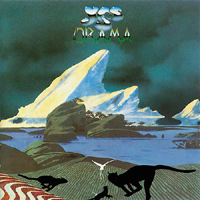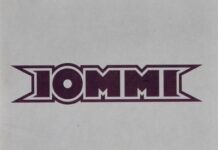From heavy guitars to the semi-hit staccato impressiveness of “Tempus
Fugit” to trying to discern where vocalist Trevor Horn doesn’t sound like
Jon Anderson (but surprised at how much he does), Drama, the
oft-maligned tenth studio album from Yes, is surely a lost gem. Seen by some
as a breath of fresh air for a band struggling through the late 70s (singer
Jon Anderson and keyboardist Rick Wakeman had walked after failed attempts to
record a follow-up to Tormato in Paris in 1979); and to others,
it’s almost sacrilege that Horn and his partner in the Buggles, keyboardist
Geoff Downes, joined such a progressive rock warhorse. To truly make this a
Yes record, producer Eddie Offord and album cover designer Roger Dean were brought
on board. In the end, Drama was the album that would transport
Yes into a new decade and jumpstart careers. It’s taken 30 years, for a lot
of people to acknowledge its brilliance.
Though the songs are credited to all the players, there are some tunes that
have that distinctive Buggles sound and others that Chris Squire, Steve Howe
and Anderson worked on before the personnel changes. At its heart though, this
is very much a Squire album as he was the primary force keeping Yes together.
“Machine Messiah,” however, features Howe on his game as much or even
more than he’s ever been, wailing through this three-part suite. It might
play out a little longer than necessary, but it is quite a smack-you-in-your-face
opening for a band that was never truly heavy.
“White Car” (a song about Gary Numan) features Alan White on timpani
and a marching snare, along with the orchestral chops of Downes. A bit light
on lyrics, it’s mostly a lush little Buggles tune finding Horn in fine
voice. “Does It Really Happen” is Squire territory highlighted by
a high-end lead bass opening and a mid-song solo. Even though it has a snappy
80s style, this one was developed before Horn and Downes stepped in. Horn isn’t
challenging Anderson’s high range and Downes lets loose.
“Into the Lens” is typically associated with a more vintage Yes sound,
though it was brought in by the Buggles. Horn sounds confident and assured,
singing in front of a sweet piano. Howe riffs behind it all with Squire and
White getting their groove on with that patented staccato mix-and-match. Overall,
it has some incredible changes, making it one of the most realized tunes on
the record. “Run Through The Light” sees engineer and soon-to-be-successful
producer Hugh Padgham employing what would become his own patented “gated
drum” sound, making White’s playing specific, precise and perfectly timed.
The band plays around a lilting rhythm set up by Downes, wavering between pop
and off-beat mélange.
“Tempus Fugit” ends the album and it’s everything this lineup
represents. There are blistering quick interludes from Downes and Howe, a little
lead bass from Squire, trademark vocal harmonies, and White’s solid beat behind
what could have become a kinetic mess if attempted by a lesser band. It certainly
is worthy of inclusion with other Yes classics, even though this version of
the band is probably the least popular.
The history of these five players gets even wackier and intertwined after they
broke up. Horn went on to a very successful career as a producer, helming the
monstrous hit “Relax” by English pop band Frankie Goes To Hollywood.
He also produced 90125, the 1983 comeback album by yet another
revamped version of Yes with White, Squire, Jon Anderson, guitarist Trevor Rabin
and original keyboardist Tony Kaye. It remains the most commercially successful
record in the storied Yes catalog. Downes and Howe formed Asia and, at press
time, are back together with singer/bassist John Wetton and drummer Carl Palmer,
touring and recording new music.
Called Drama because of the “drama” surrounding
the band at the time, this lost gem deserves repeated listenings. Yes became
a much leaner band in the 80s with the influence of Rabin, and has since experienced
a high turnover in personal changes. Needless to say, it’s been a long wacky
road for the band. A true transitional record, Drama is a hint
of what Yes was capable of when ego is kept in check and drama is left out of
the studio.
~ Ralph Greco, Jr.




















